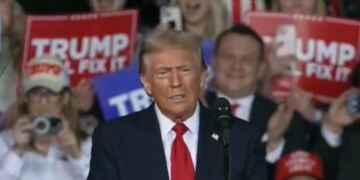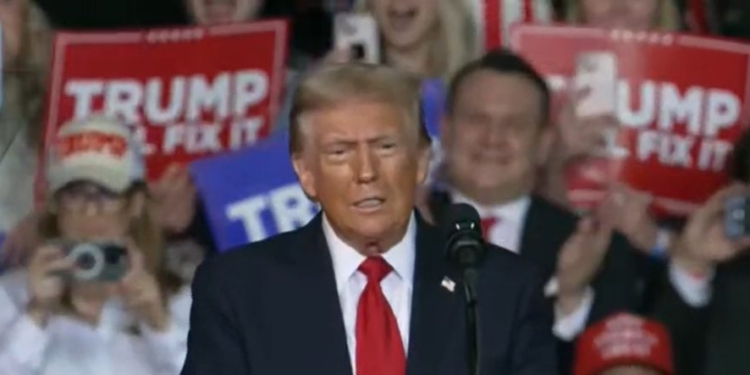President Donald Trump has plenty of targets to choose from to begin his war against blue state lawsuits and legislation designed to punish energy companies for their role in climate change.
On April 8, Trump signed an executive order titled “Protecting American Energy From State Overreach” instructing his administration to investigate state-level attempts to sue or otherwise extract massive payouts from energy companies in the name of climate change. Some of the states Trump is poised to target under the new executive order will likely include New York, California and other Democrat-dominated jurisdictions that have sought to extract billions of dollars from the energy sector to line government coffers.
“American energy dominance is threatened when State and local governments seek to regulate energy beyond their constitutional or statutory authorities,” the executive order states. “For example, when States target or discriminate against out-of-State energy producers by imposing significant barriers to interstate and international trade, American energy suffers, and the equality of each State enshrined by the Constitution is undermined. Similarly, when States subject energy producers to arbitrary or excessive fines through retroactive penalties or seek to control energy development, siting, or production activities on Federal land, American energy suffers.”
Attorney General Pam Bondi will have 60 days to provide a report to Trump outlining laws, lawsuits and other policies to target with legislation or other actions. The Justice Department declined to comment.
Trump specifically referenced California’s “cap and trade” emissions scheme and New York’s so-called “Climate Change Superfund Act” in his executive order as the types of policies he wants his administration to probe and fight back against. The “cap and trade” law limits greenhouse gas emissions statewide and allows polluters to trade emissions permits among themselves, while New York’s law requires energy companies to give the state $3 billion annually for 25 years so that the state can use the cash to advance green energy and climate-focused projects.
Some of the initiatives that figure to benefit from New York’s law include, but are not limited to, drainage system upgrades, renovating buildings to be more green, “preventive health care programs” and building “green spaces” in urban areas, according to the statute’s text.
Both laws have drawn scrutiny from critics who contend that they each impose needless restrictions and costs on energy producers, which are then more inclined to pass on costs to consumers or to leave the state altogether.
The state of California, in addition to several of its municipalities, has filed a lawsuit against several major oil corporations seeking massive settlements, alleging that the corporations internally knew that their products drive climate change while misleading the public. Democratic California Attorney General Rob Bonta also filed a lawsuit against ExxonMobil in September 2024 alleging that the company misled the public about the efficacy of its advanced recycling techniques, though Bonta struggled to defend the litigation during an interview on CNBC that same month.
It’s not just California and New York that have used the judiciary and the legislature to go after energy producers.
Connecticut, Minnesota, New Jersey and Rhode Island all have launched their own similar climate change lawsuits against oil and gas companies, and a number of Democrat-run cities and counties — including Chicago and Honolulu — have pursued similar litigation against energy producers.
Notably, many of the public prosecutors pursuing the cases have agreed to contingency fee contracts with outside law firms like Sher Edling to assist with the proceedings. These specific contracts stipulate that the private firms will only reap a major payday in the event of the state recovering fees from the defendants, meaning that private attorneys could walk away with millions ostensibly owed to the taxpayers if they are able to land settlements.
Some of the climate change tort lawsuits, including those pursued by New Jersey and Baltimore, have been dismissed in recent months. In the New Jersey case, a state judge ruled that the lawsuit preempted the federal government, and Baltimore’s suit was dismissed by a Maryland judge who opined that the city’s complaint “goes beyond the limits of Maryland state law.”
Other than New York, Vermont has also passed its own version of a “superfund” law. Vermont’s legislation dictates that energy companies responsible for at least one billion tons of global emissions must make payments — likely billions of dollars — to the state’s coffers to fund various climate projects.
Democrats in numerous other states, including Maryland, Oregon, Massachusetts and California, were also considering their own similar laws as of March 2024, according to Columbia University’s Sabin Center for Climate Change Law.
Broadly, critics of the climate litigation and “polluters pay” laws argue that these actions will hamstring energy production at the expense of consumers, infringe on the federal government’s responsibility to regulate interstate commerce and result in a more restrictive and fragmented regulatory environment for energy. Trump mentioned these specific points in the body of the executive order.
“These State laws and policies try to dictate interstate and international disputes over air, water, and natural resources; unduly discriminate against out-of-State businesses; contravene the equality of States; and retroactively impose arbitrary and excessive fines without legitimate justification,” Trump wrote in the executive order. “These State laws and policies are fundamentally irreconcilable with my Administration’s objective to unleash American energy. They should not stand.”
(Featured Image Media Credit: Screen Capture/CSPAN)
All content created by the Daily Caller News Foundation, an independent and nonpartisan newswire service, is available without charge to any legitimate news publisher that can provide a large audience. All republished articles must include our logo, our reporter’s byline and their DCNF affiliation. For any questions about our guidelines or partnering with us, please contact [email protected].



























 Continue with Google
Continue with Google